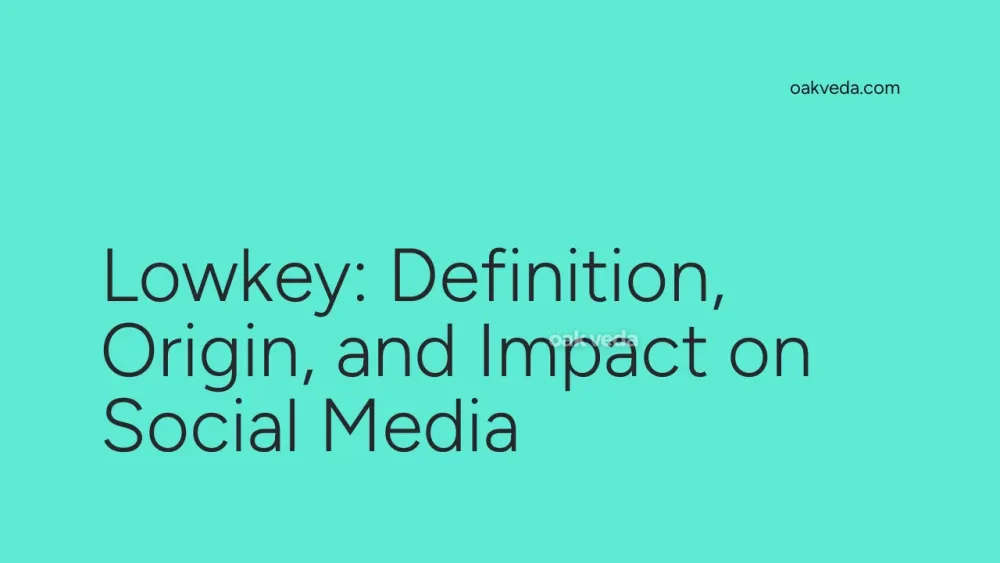
What is Lowkey?
Lowkey is a popular slang term used extensively on social media platforms to express a desire for discretion or to downplay the intensity of one's feelings or actions. In essence, it's a way to communicate that something is being kept low-profile or under the radar. The term has become an integral part of online vernacular, particularly among younger generations.
Origin and Development of Lowkey
The term "lowkey" originated from African American Vernacular English (AAVE) and has been a part of spoken language for decades. However, its widespread use in social media contexts is a more recent phenomenon. As digital communication evolved, "lowkey" found its way into text-based interactions, becoming a staple in online conversations, comments, and posts.
Initially used primarily within African American communities, the term has since been adopted by a broader audience, particularly as social media platforms facilitated the rapid spread of slang and colloquialisms across different demographic groups.
How Lowkey Works in Social Media Communication
In social media contexts, "lowkey" serves several functions:
-
Understatement: Users often employ "lowkey" to downplay their enthusiasm or interest in something. For example, "I'm lowkey excited about the new movie release."
-
Secrecy or Discretion: It can indicate a desire to keep something private or not widely known. For instance, "I'm lowkey crushing on my coworker."
-
Subtle Admission: The term allows users to express feelings or opinions without being too direct. "This party is lowkey boring" suggests dissatisfaction without being overly critical.
-
Humor and Irony: Sometimes, "lowkey" is used ironically to express the opposite of what's being said. "I'm lowkey obsessed with this new song" might actually mean the person is very enthusiastic about it.
Types or Variations of Lowkey
While "lowkey" itself is a specific term, it's often used in conjunction with other words or phrases to create variations:
- Lowkey lit: Describing something as subtly exciting or enjoyable
- Lowkey flex: Humbly bragging about something without being too obvious
- Lowkey stressed: Expressing mild anxiety or concern about a situation
Popular Examples of Lowkey in Social Media
Across various social media platforms, you'll find "lowkey" used in numerous contexts:
- On Twitter: "This new coffee shop is lowkey the best in town. #CoffeeLovers"
- In Instagram captions: "Lowkey living my best life ð"
- In TikTok comments: "That dance routine is lowkey fire ð¥"
Impact of Lowkey on Social Media Culture
The widespread adoption of "lowkey" has significantly impacted social media culture:
-
Nuanced Communication: It allows users to express subtle emotions and attitudes that might be difficult to convey in short-form content.
-
Cultural Exchange: As the term spread beyond its AAVE origins, it facilitated cross-cultural communication and understanding.
-
Trend Setting: The popularity of "lowkey" has inspired the creation and adoption of similar slang terms in online spaces.
-
Generational Markers: Usage of terms like "lowkey" often serves as a generational identifier, particularly among Millennials and Gen Z.
Controversies Surrounding Lowkey
The mainstreaming of "lowkey" has not been without controversy:
-
Cultural Appropriation: Some argue that the widespread use of AAVE terms like "lowkey" by non-Black individuals constitutes cultural appropriation.
-
Misuse and Overuse: As with many popular slang terms, "lowkey" is sometimes used incorrectly or excessively, leading to criticism from language purists.
How Brands and Influencers Use Lowkey
Savvy brands and influencers have incorporated "lowkey" into their social media strategies:
- Relatable Content: Using "lowkey" in posts helps brands appear more relatable and in touch with younger audiences.
- Soft Selling: Influencers might use the term to subtly promote products without seeming too pushy. "Lowkey obsessed with this new skincare routine."
- Engagement Boosting: The term can be used to encourage interaction. "Lowkey thinking about changing my hair color. Thoughts?"
Future Trends Related to Lowkey
As social media language continues to evolve, we can expect:
- New Variations: The creation of new phrases and contexts incorporating "lowkey."
- Semantic Shift: Potential changes in how the term is used or understood over time.
- Cross-Platform Adaptation: Different interpretations or uses of "lowkey" may emerge on various social media platforms.
FAQs about Lowkey
-
Is "lowkey" the opposite of "highkey"? Yes, "highkey" is often used to express overt or intense feelings, contrasting with the subtlety of "lowkey."
-
Can "lowkey" be used in formal communication? It's generally considered informal and is best reserved for casual, social media-type interactions.
-
Is using "lowkey" appropriate for all ages? While not offensive, it's more commonly used by younger generations and might sound out of place coming from older individuals or in professional settings.
-
How do you spell "lowkey"? It can be spelled as one word "lowkey" or two words "low key." The single-word version is more common in social media contexts.
Understanding and appropriately using terms like "lowkey" can significantly enhance one's ability to communicate effectively on social media platforms. As with all slang, it's important to be aware of the context and audience when incorporating such terms into your online interactions.
You may be interested in:
- CTR (Click-Through Rate): Definition, Origin, and Impact
- Affiliate Marketing: Definition, Origin, and Impact
- Content Creator: Definition, Origin, and Impact
- CTA: Definition, Origin, and Impact in Social Media Marketing
- Influencer Marketing Management: Definition, Origin, and Impact
- Opp: Definition, Origin, and Impact in Social Media

